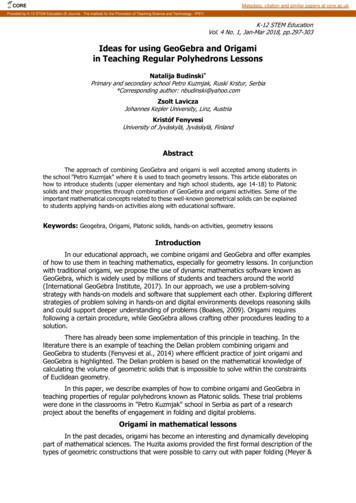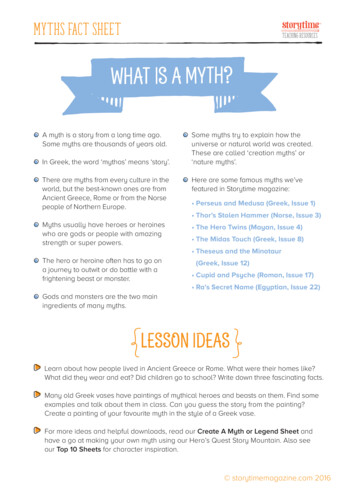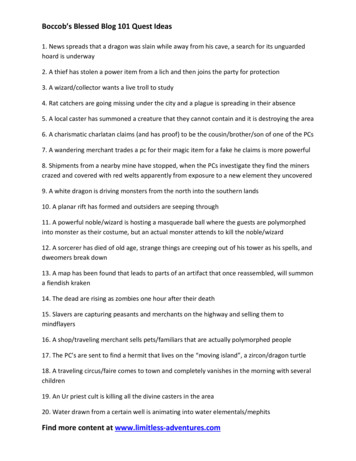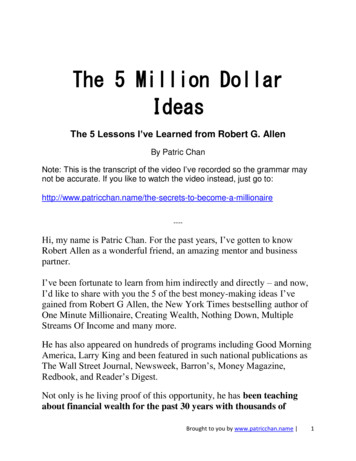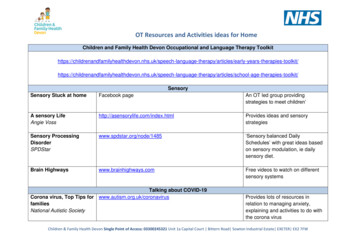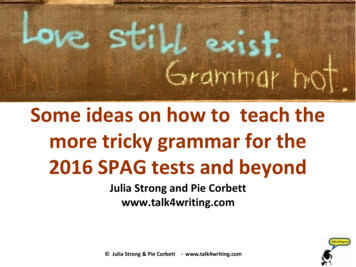
Transcription
Some ideas on how to teach themore tricky grammar for the2016 SPAG tests and beyondJulia Strong and Pie Corbettwww.talk4writing.com Julia Strong & Pie Corbett - www.talk4writing.com
Handout 1A little test to warm you up The Great Never-Heard-the-Word Grammar TestX Never heardbefore? Heard – not sure Know what it means: canof meaning – don’t stand up and explain itswant to stand upfunction giving an exampleand explainwithin a sentence1. subordinateclause2. possessivepronoun3. adverbial13. subjunctive Julia Strong & Pie Corbett - www.talk4writing.com
We know more than we thought1. The old man jumped quickly over the rusty fence.2.Hejumpedoverit.Where are the nouns – what is their job?Where are the adjectives – what is their job?Where is the verb – what is its job?Where is the adverb – what is its job?Where are the pronouns – what is their jobWhere is the preposition – what is its job?And ‘the’ is a ?Is subject, verb, object the typical order of asentence in English? Julia Strong & Pie Corbett - www.talk4writing.com
We know more than we thought1. The old man jumped quickly over the rusty s – name the things talked aboutadjectives – describe the nounsverbs – say what the action isadverbs – describe the verbpronouns – stand in the place of a nounprepositions – tell you the position of the actiondeterminers – pin down the noun preciselyTypical sentence order in English is subject (carriesout action), verb, object (action is done to it). Julia Strong & Pie Corbett - www.talk4writing.com
We know more than we thought the old man bright red across the roadWhich is the noun phrase?Which is the adjectival phrase?Which is the prepositional phrase?Now turn the noun phrase into an extended nounphrase! Julia Strong & Pie Corbett - www.talk4writing.com
Building confidence with the trickier bitsDiscussion of function is the key toconfidence with the naming of partsUse the “investigate and define” approach toenable the children to have the confidence toexplain to someone else the function of thedifferent word classes or the nature of variousgrammar features. Julia Strong & Pie Corbett - www.talk4writing.com
DeterminerUsing discussion to build confidencewith understanding the terminologyWhat are determiners?Determiners For example, Julia Strong & Pie Corbett - www.talk4writing.com
Determiner1.2.3.4.5.The determiners below have all been highlightedand the nouns underlined.– What is the function of determiners?– Where are they positioned?I saw his dog eat six sandwiches.I saw your dog eat several sandwiches.That dog ate those sandwiches.Some dogs like eating a few sandwiches.I like this dog better than that one. Julia Strong & Pie Corbett - www.talk4writing.com
DeterminerWhat’s the difference in meaning betweena & the?1. I have just seen a dog.2. I have just seen the dog.(Definite & indefinite articles are determiners) Julia Strong & Pie Corbett - www.talk4writing.com
DeterminerSome words can be determiners orpronouns. It all depends on their functionin the sentence.Discuss which of the underlined words below aredeterminers and which are pronouns.How you would explain the difference1. Put that box over there.2. Put that over there.3. That box is his box.4. That is his. Julia Strong & Pie Corbett - www.talk4writing.com
DeterminerIs it a pronoun or a determiner?Remember functionPut that box over there.Put that over there.That box is his box.That is his.Pronouns stand in the place of nouns/noun phrasesDeterminers define nouns and are always placedright in front of them Julia Strong & Pie Corbett - www.talk4writing.com
The pronoun/ determiner challengeAll the pronouns and determiners below have beenhighlighted in blue. Identify all the pronouns.“Hey!” shouted a neighbour from a fewhouses down our street. “Leave my cat alone.”“What do you mean, your cat? This is mycat, Kipper. I’ve been feeding her eachmorning and evening for ten years,” I yelledback.“Look, that’s Tiddles,” insisted the neighbour,and she’s not yours. She sleeps on my bedevery night. That cat is mine.” Julia Strong & Pie Corbett - www.talk4writing.com
The pronoun/determiner challengePronouns: stand in the place of nounsDeterminers: are placed in front of the noun they define“Hey!” shouted a neighbour from a fewhouses down our street. “Leave my cat alone.”“What do you mean, your cat? This is mycat, Kipper. I’ve been feeding her eachmorning and evening for ten years,” I yelledback.“Look, that’s Tiddles,” insisted the neighbour,and she’s not yours. She sleeps on my bedevery night. That cat is mine.” Julia Strong & Pie Corbett - www.talk4writing.com
DeterminerWhat are determiners?Determiners For example, and pronouns For example, Julia Strong & Pie Corbett - www.talk4writing.com
DeterminerThe determiner challengeSee if you can reorder the determiners in thispassage it so it makes good sense:Each baker grinned as he turned a pies over. Theywere cooked on a sides. Three pie had thebeautiful crust. The two cat sidled up to our safehiding place, the eyes scanning for scraps. Allpassing dog stared in at that door. Its cook glaredat his animals. Julia Strong & Pie Corbett - www.talk4writing.com
What is grammar? “Grammar is the business of taking a language topieces to see how it works.” – Professor David CrystalGrammar provides the ‘rules’ for joining words andphrases into sentences. The function of a word orphrase within a sentence is key to understandinggrammar so a good place to start is to encouragechildren to love reading and to experience qualitywritten language. Julia Strong & Pie Corbett - www.talk4writing.com
Grammatical knowledge: Knowing the function of words in sentences andhow sentences work and are tied together.Grammatical skills: Choosing the right words and phrases Constructing and varying sentences Linking texts together (cohesion)Teach the knowledge through the skills Julia Strong & Pie Corbett - www.talk4writing.com
The Test In 2014 approx 20% name and identify. By 2016 this risesto approx 45%. In 2014 approx 80% grammatical accuracy (makingsentences correct). By 2016 this sinks to approx 55%. Focus: function – word classes, features of sentences(including punctuation), complex sentences, standardEnglish, levels of formality. From 2016 includes subjunctive, past progressive, selecting which tense is the most definite, identifying when aword is used as a subordinating conjunction/preposition,& explaining how a comma can change meaning. Julia Strong & Pie Corbett - www.talk4writing.com
Teaching grammatical skill and knowledgeeffectively within a Talk-for-Writing unit use assessment to identify grammar skills needed in aunit (cold task) ensure your model text includes these features introduce grammar through games and activities linkedto text type and progress (warming-up) demonstrate how to use grammar features in sharedwriting and investigate in shared reading application – expect children to use the features intheir own writing Help the children to discuss these features so thatthey can lead the discussion use feedback to check on how effectively it was usedand what you need to teach Build in progression across the years Pie Corbett & Julia Strong - www.talk4writing.com
Bringing out the grammar inexemplar text Decide which features you want to focus onand devise games that help the pupils see howit functions within meaningful text. Build the grammar features you are focusing oninto the model text to increase understandingof, and confidence in using, these features. Pie Corbett & Julia Strong - www.talk4writing.com
Spot the odd ones out: Which 2 highlighted words arenot prepositions? What is the function of prepositions?The Hodja and the grapesOne day, the Hodja put two big baskets of grapes on his donkeyand set off to the market.On his way, he stopped to rest under the shade of a large plane tree,beside a stream, near where other men and their donkeys werealso resting. While the men were dozing, the Hodja started to takegrapes from their baskets and transfer them into his. One of the menwoke up and angrily demanded to know what he thought he wasdoing. The Hodja quickly explained, “Don’t mind me. I’m a bit madand often do strange things.”“In that case”, retorted the man, “why don’t you take grapesout of your basket and put them in someone else’s?”Looking up quizzically, the Hodja replied. “I’m not that mad!” Pie Corbett & Julia Strong - www.talk4writing.com
What word class has been highlighted?The Hodja and the grapesOne day, the Hodja put two big baskets of grapes on his donkeyand set off to the market.On his way, he stopped to rest under the shade of a large plane tree,beside a stream, near where other men and their donkeys wereresting. While the men were dozing, the Hodja started to takegrapes from their baskets and transfer them into his. One of the menwoke up and angrily demanded to know what he thought he wasdoing. The Hodja quickly explained, “Don’t mind me. I’m a bit madand often do strange things.”“In that case”, retorted the man, “why don’t you take grapesout of your basket and put them in someone else’s?”Looking up quizzically, the Hodja replied. “I’m not that mad!” Pie Corbett & Julia Strong - www.talk4writing.com
Alternative words for said games By alphabetical order– A. answered, asked, added, advised – B. babbled, boomed, blurted, booed– C. cried, croaked, commanded, claimed – D. demanded, denied, derided, described By categories– Loud: shouted, screamed; bellowed, hooted – Soft: whispered, muttered, mouthed – Sad: cried, sobbed, moaned – Questioning: asked, demanded, enquired – Answering: replied, retorted, explained Pie Corbett & Julia Strong - www.talk4writing.com
What is highlighted this time? Blue ?Pink ?One day, the Hodja put two big baskets of grapes on hisdonkey and set off to the market.On his way, he stopped to rest under the shade of a largeplane tree, beside a stream, near where other men andtheir donkeys were resting. While the men were dozing, theHodja started to take grapes from their baskets andtransferred them into his. One of the men woke up andangrily demanded to know what he thought he was doing.The Hodja quickly explained, “Don’t mind me. I’m a bit madand often do strange things.”“In that case”, retorted the man, “why don’t you takegrapes out of your basket and put them in someone else’s?”Looking up quizzically, the Hodja replied. “I’m not thatmad!” Pie Corbett & Julia Strong - www.talk4writing.com
Independent embellishingOnce children have internalised the underlyingpattern of storytelling and innovation, tryextending their confidence with independentembellishment of stories. Tell the story Class listens and turns into text map Children in pairs retell the storyembellishing it as they go.eg. The Hodja and the grapes Pie Corbett & Julia Strong - www.talk4writing.com
Tick one box in each row to show whether the word before isused as a subordinating conjunction or as a preposition.Sentencebefore used as a before used assubordinatinga prepositionconjunctionWe left the cinemabefore the end of thefilm.The train ticket Ischeaper before 9.00 inthe morning.I brush my teeth before Ihave breakfast.Source: Sample 2016KS2 grammar test Pie Corbett & Julia Strong - www.talk4writing.com
Is the highlighted word in each pair of sentences a preposition or asubordinating conjunction? How would you explain this?1a. I was in the queue before you.1b. Before you go to bed, you should brush yourteeth.2a. I added my name after yours.2b. After he saw the dragon, he felt afraid.3a. Do not open the door, until the train has stopped.3b. She read the book until breaktime.4a. When it stops raining, we will go.4b. When will it stop? Pie Corbett & Julia Strong - www.talk4writing.com
Is the highlighted word in each pair of sentences a preposition or asubordinating conjunction? How would you explain this?1a. I was in the queue before you.1b. Before you go to bed, you should brush yourteeth.2a. I added my name after yours.2b. After he saw the dragon, he felt afraid.3a. Do not open the door, until the train has stopped.3b. She read the book until breaktime.4a. When it stops raining, we will go.4b. When will it stop? Pie Corbett & Julia Strong - www.talk4writing.com
When, after, until, before and since can functionas subordinating conjunctions or prepositions If the underlined word introduces a clause (iea clump of meaningful words with a verb in it),it’s functioning as a subordinating conjunction. If it just tells you the position of something, it’sfunctioning as a preposition.Warning! They can both spin the sentencesround because prepositional phrases areadverbials and adverbials can rove aroundsentences. Pie Corbett & Julia Strong - www.talk4writing.com
Tick one box in each row to show whether the word before isused as a subordinating conjunction or as a preposition.Sentencebefore used as a before used assubordinatinga prepositionconjunctionWe left the cinemabefore the end of thefilm.The train ticket Ischeaper before 9.00 inthe morning.I brush my teeth before Ihave breakfast.Source: Sample 2016KS2 grammar test Pie Corbett & Julia Strong - www.talk4writing.com
Games to revise and build confidence1. Matching games:Match the high-lighted text with its technical term(play these games several times over a year)Eg: Possessive pronounIs that hers?Handout 2 Pie Corbett & Julia Strong - www.talk4writing.com
Games to revise and build confidenceGrammar dominoesnouncomplexsentenceHandout 3simplesentence Pie Corbett & Julia Strong - www.talk4writing.comadverbial
More tricky stuffPunctuation: You know more than you think you knowExplain why these have been placed in this order,;:Where would you place a single dash Pie Corbett & Julia Strong - www.talk4writing.com.–?
The function of punctuationPunct
Bringing out the grammar in exemplar text Decide which features you want to focus on and devise games that help the pupils see how it functions within meaningful text. Build the grammar features you are focusing on into the model text to increase understanding of, and confidence in using, these features.


